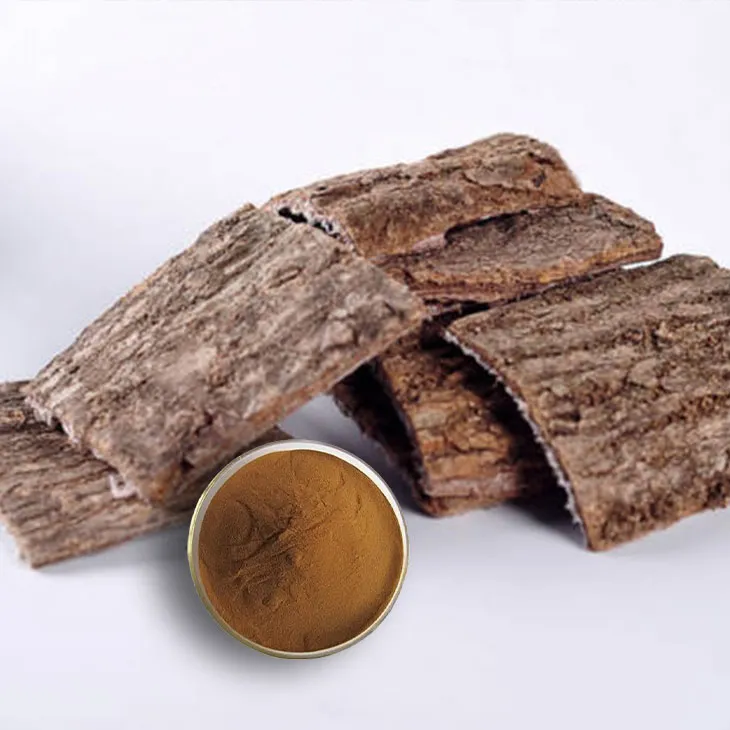- 0086-571-85302990
- sales@greenskybio.com
Does Eucommia ulmoides extract have benefits for diabetes? Are these all safe and applicable for diabetic patients?
2024-11-12

1. Introduction
Diabetes has become a global health issue, affecting millions of people worldwide. It is characterized by abnormal blood glucose regulation, which can lead to a variety of complications over time. In the search for natural remedies to manage diabetes, Eucommia Ulmoides Extract has attracted attention. Eucommia ulmoides is a traditional Chinese medicinal plant, and its extract is believed to possess various bioactive components that may potentially benefit diabetic patients. However, it is crucial to thoroughly understand both its benefits and safety aspects, especially considering the diverse nature of diabetes types and individual patient conditions.

2. Components of Eucommia Ulmoides Extract
Eucommia Ulmoides Extract contains a rich array of chemical components. Flavonoids are one of the major groups present in the extract. These flavonoids have antioxidant properties. They can scavenge free radicals in the body, which are often increased in diabetic patients due to oxidative stress. Another important component is lignans. Lignans are thought to play a role in regulating various physiological processes in the body, including those related to glucose metabolism.

3. Potential Benefits for Diabetes
3.1. Glucose Regulation
One of the key aspects in diabetes management is the regulation of blood glucose levels. Eucommia ulmoides extract may have a positive impact on this. Some studies suggest that certain components in the extract can enhance insulin sensitivity. Insulin is a hormone that is crucial for the uptake of glucose by cells. When insulin sensitivity is improved, cells are better able to respond to insulin, allowing for more efficient glucose uptake from the bloodstream. This can help in reducing high blood glucose levels, a hallmark of diabetes.
3.2. Anti - inflammatory Effects
Chronic inflammation is often associated with diabetes. Inflammatory cytokines can disrupt normal metabolic processes and contribute to insulin resistance. Eucommia ulmoides extract has been shown to possess anti - inflammatory properties. Polyphenols in the extract can inhibit the production of inflammatory cytokines. By reducing inflammation, it may potentially improve insulin sensitivity and overall glycemic control in diabetic patients.
3.3. Protection of Vascular Endothelium
Diabetes is associated with damage to the vascular endothelium, which can lead to various cardiovascular complications. Eucommia ulmoides extract may help protect the vascular endothelium. Components such as flavonoids can enhance the function of endothelial cells. They can promote the production of nitric oxide, which is important for vasodilation and maintaining normal blood vessel function. By protecting the vascular endothelium, it may reduce the risk of cardiovascular diseases in diabetic patients.

4. Safety Considerations
4.1. General Safety
When considering the safety of Eucommia ulmoides extract for diabetic patients, it is important to note that in general, when used at appropriate doses, it has been shown to be relatively safe in pre - clinical and some clinical studies. However, as with any supplement, there can be potential side effects. Some individuals may experience mild gastrointestinal discomfort such as nausea or diarrhea. These side effects are usually mild and may subside with continued use or dose adjustment.
4.2. Interaction with Medications
Diabetic patients are often on multiple medications to manage their condition. Eucommia ulmoides extract may interact with some medications. For example, it may interact with hypoglycemic drugs. If a diabetic patient is taking medications to lower blood glucose levels and also uses Eucommia ulmoides extract, there is a risk of hypoglycemia (low blood glucose). It is essential that diabetic patients consult their healthcare providers before starting to use Eucommia ulmoides extract, especially if they are on multiple medications.
4.3. Different Diabetes Types
There are different types of diabetes, such as type 1 diabetes and type 2 diabetes. Type 1 diabetes is an autoimmune disease where the body's immune system destroys the insulin - producing cells in the pancreas. Type 2 diabetes is mainly characterized by insulin resistance and relative insulin deficiency. The safety and potential benefits of Eucommia ulmoides extract may vary depending on the type of diabetes. In type 1 diabetes, while the extract may still have some beneficial effects on complications related to diabetes such as vascular protection, its impact on glucose regulation may be more limited as these patients require exogenous insulin replacement. In type 2 diabetes, where lifestyle factors and insulin resistance play a major role, the extract may have more potential in terms of improving insulin sensitivity and glucose control.

5. Patient - Specific Conditions
Individual patient conditions also need to be considered when evaluating the safety and benefits of Eucommia ulmoides extract for diabetes. For example, patients with impaired liver or kidney function may need to be more cautious. The body's ability to metabolize and excrete the components of the extract may be affected in these patients. Additionally, pregnant or breastfeeding women with diabetes should also be careful. There is limited information regarding the safety of Eucommia ulmoides extract in these special patient populations. It is always advisable for these patients to seek medical advice before using the extract.
6. Research Gaps and Future Directions
Despite the potential benefits and the initial research on Eucommia ulmoides extract in relation to diabetes, there are still significant research gaps. More large - scale, well - designed clinical trials are needed to further confirm its efficacy in different diabetes types and patient populations. Long - term safety studies are also required, especially for those with comorbidities. Future research should also focus on elucidating the exact mechanisms of action of the various components in the extract in relation to diabetes. This will help in better understanding how to optimize its use for diabetic patients.
7. Conclusion
Eucommia ulmoides extract shows potential benefits for diabetes in terms of glucose regulation, anti - inflammatory effects, and vascular endothelium protection. However, its safety for diabetic patients is a complex issue that depends on various factors such as general safety, interaction with medications, diabetes type, and patient - specific conditions. Diabetic patients should always consult their healthcare providers before using Eucommia ulmoides extract to ensure that it is both safe and potentially beneficial for their individual situation.
FAQ:
Q1: What are the potential benefits of Eucommia ulmoides extract for diabetes?
Eucommia ulmoides extract may have several potential benefits for diabetes. It may help in regulating blood sugar levels. Some studies suggest that it could enhance insulin sensitivity, which is crucial for better glucose metabolism in diabetic patients. Additionally, it might have antioxidant properties that can protect the body's cells from damage caused by high blood sugar levels over time.
Q2: How does Eucommia ulmoides extract regulate blood sugar?
The exact mechanism by which Eucommia ulmoides extract regulates blood sugar is not fully understood. However, it is hypothesized that certain compounds in the extract may interact with the body's metabolic pathways related to glucose uptake and utilization. For example, it may stimulate cells to take up more glucose from the bloodstream, similar to how insulin works, or it may affect the liver's production and release of glucose.
Q3: Is Eucommia ulmoides extract safe for all types of diabetic patients?
While Eucommia ulmoides extract shows promise, it may not be safe for all types of diabetic patients. Diabetics with certain underlying health conditions, such as kidney problems, may need to be cautious. Some components of the extract could potentially interact with medications used to treat diabetes or other comorbidities. Therefore, it is essential for patients to consult their healthcare providers before using it.
Q4: Are there any side effects of using Eucommia ulmoides extract for diabetes?
There may be some potential side effects. In some cases, it could cause mild digestive issues like stomach upset or diarrhea. However, these side effects are not very common and may vary from person to person. Long - term use may also pose unknown risks, which is another reason why medical advice is necessary before starting to use it.
Q5: Can Eucommia ulmoides extract replace diabetes medications?
No, Eucommia ulmoides extract cannot replace diabetes medications. While it may have beneficial effects on blood sugar regulation, it is not a substitute for the medications prescribed by a healthcare professional. Diabetes medications are specifically designed to control blood sugar levels based on the patient's individual needs, and stopping them without medical advice can be extremely dangerous.
Related literature
- The Effects of Eucommia ulmoides Extract on Blood Glucose in Diabetic Mice"
- "Safety and Efficacy of Eucommia ulmoides in Diabetic Patients: A Meta - analysis"
- "Eucommia ulmoides and Diabetes: A Review of Potential Mechanisms"
- ▶ Hesperidin
- ▶ Citrus Bioflavonoids
- ▶ Plant Extract
- ▶ lycopene
- ▶ Diosmin
- ▶ Grape seed extract
- ▶ Sea buckthorn Juice Powder
- ▶ Fruit Juice Powder
- ▶ Hops Extract
- ▶ Artichoke Extract
- ▶ Mushroom extract
- ▶ Astaxanthin
- ▶ Green Tea Extract
- ▶ Curcumin
- ▶ Horse Chestnut Extract
- ▶ Other Product
- ▶ Boswellia Serrata Extract
- ▶ Resveratrol
- ▶ Marigold Extract
- ▶ Grape Leaf Extract
- ▶ New Product
- ▶ Aminolevulinic acid
- ▶ Cranberry Extract
- ▶ Red Yeast Rice
- ▶ Red Wine Extract
-
Chia Seed Powder
2024-11-12
-
Echinacea Extract
2024-11-12
-
Green Tea Extract
2024-11-12
-
Yam Extract
2024-11-12
-
Longan Extract
2024-11-12
-
Boswellia Serrata Extract
2024-11-12
-
Plantain extract
2024-11-12
-
Green coffee bean Extract
2024-11-12
-
Passionflower Extract
2024-11-12
-
Rosemary extract
2024-11-12





















